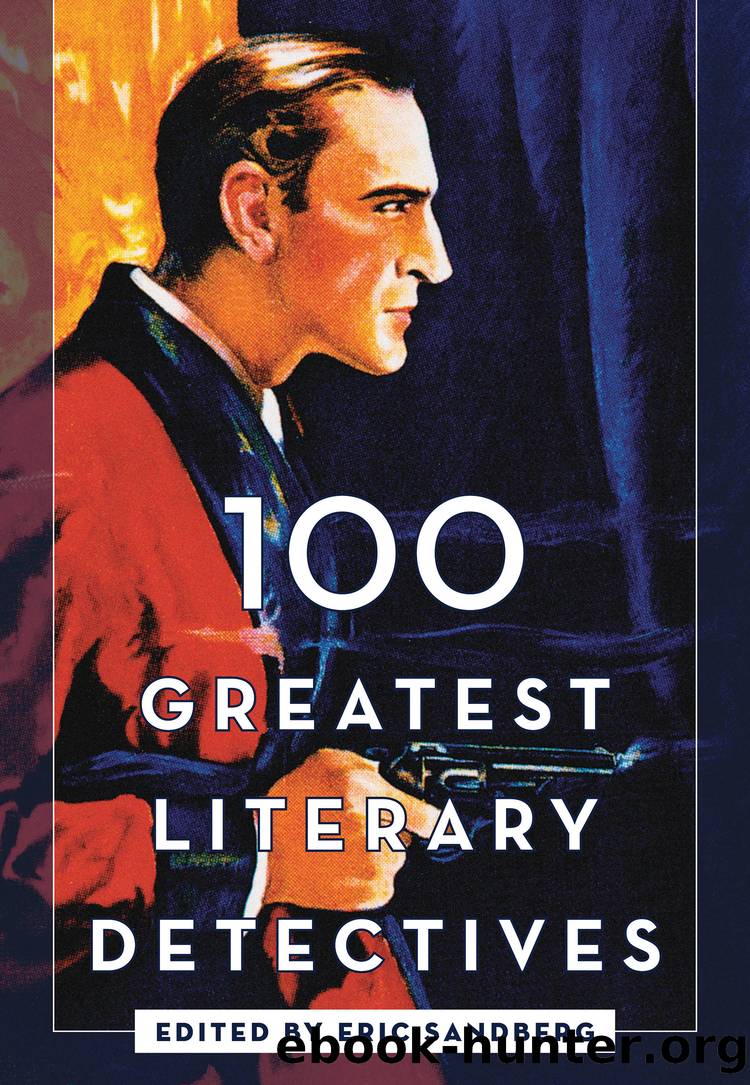100 Greatest Literary Detectives by Eric Sandberg

Author:Eric Sandberg [Sandberg, Eric]
Language: eng
Format: epub
Publisher: Rowman & Littlefield Publishers
Published: 2018-02-22T00:00:00+00:00
Lieutenant David Klein
James Ellroy
(1948â)
James Ellroyâs description of himself as âthe greatest crime writer who ever livedâ may be hyperbolic, but there is no doubt he is one of the major figures in contemporary crime fiction.2 His novels offer a bleak yet powerful vision of American history and human nature, and do so in a sharply stylized prose that shames the sometimes pedestrian writing of mainstream crime fiction. Yet his investigative figures sit uneasily alongside the luminaries of the genre. While many fictional detectives exhibit character flaws and weaknessesâthink of Sherlock Holmesâs cocaine habit, or the social isolation and alcoholism of many hard-boiled detectivesâEllroyâs investigators shatter the central distinction between detective and criminal.
Lieutenant David Klein is a perfect example of this sort of transgressive Ellroyian figure. He appears in White Jazz (1992), the final novel in the LA Quartet, a series that charts the links between crime, politics, the entertainment industry, and the justice system in 1940s and 1950s Los Angeles. Kleinâs career has been shaped by the systematic corruption and endemic moral failure of his world. He joined the Los Angeles Police Department (LAPD) in 1938, fought against the Japanese during World War II, and returned to the force in 1945, joining an âex-Marine goon squadâ dedicated to strike-breaking and off-the-book law enforcement. Meanwhile, Klein put himself through law school by doing strong-arm work for the Mob, becoming known as âthe Enforcer.â3 A brief flirtation with a Hollywood acting career led to more lucrative blackmail work targeting homosexual celebrities.
This background obviously compromises Klein as a representative of justice, but worse is to come. Having killed two hoods for mistreating his sister, Klein has exposed himself to Mob blackmail and become their hit man, the role in which readers first encounter him in White Jazz. Assigned to protect boxer Sanderline Johnson, he instead throws him out of a hotel window to stop him from testifying for a federal investigation into mob infiltration of the sport. This role inversion is essential to Kleinâs character: he does not just work on both sides of the law but is the antithesis of everything we believeâor at least hopeâthe police are.
Kleinâs transgressions are not limited to his professional life; he is also personally compromised. For example, his dual police/criminal career has obviously had financial rewards; this is one policemanâand as Ellroy represents the LAPD, he is not aloneâwho does not have to rely on his salary and pension. Instead, Klein has ploughed the profits of his illicit career into the slum properties he manages with his sister. When tenants are late with the rent, he sends gun-for-hire Jack Woods around to beat up the deadbeats. His relationship with his sister is similarly disturbing, as Klein has long harbored incestuous desires for this âwoman [he] had no business loving.â4 Incest is one of our strongest and most persistent social taboos, and it is no accident that Kleinâs desires lead him toward breaking this rule too.
If this were all there were to Klein, he would be an
Download
This site does not store any files on its server. We only index and link to content provided by other sites. Please contact the content providers to delete copyright contents if any and email us, we'll remove relevant links or contents immediately.
4 3 2 1: A Novel by Paul Auster(11101)
The handmaid's tale by Margaret Atwood(6895)
Giovanni's Room by James Baldwin(5936)
Big Magic: Creative Living Beyond Fear by Elizabeth Gilbert(4762)
Asking the Right Questions: A Guide to Critical Thinking by M. Neil Browne & Stuart M. Keeley(4625)
On Writing A Memoir of the Craft by Stephen King(4248)
Ego Is the Enemy by Ryan Holiday(4020)
Ken Follett - World without end by Ken Follett(3992)
The Body: A Guide for Occupants by Bill Bryson(3860)
Bluets by Maggie Nelson(3743)
Adulting by Kelly Williams Brown(3704)
Guilty Pleasures by Laurell K Hamilton(3615)
Eat That Frog! by Brian Tracy(3548)
White Noise - A Novel by Don DeLillo(3453)
The Poetry of Pablo Neruda by Pablo Neruda(3388)
Alive: The Story of the Andes Survivors by Piers Paul Read(3334)
The Book of Joy by Dalai Lama(3258)
The Bookshop by Penelope Fitzgerald(3248)
Fingerprints of the Gods by Graham Hancock(3240)
